Keyword research has changed a lot over the past few years—from merely searching for long-tail opportunities with lower competition to in-depth niche research.
Moreover, keywords are no longer the sole focus of rankings; search engine optimization now includes context, intent, location, authority, citations, etc.
The tools discussed in this article will help you adapt to the ongoing evolution.
These tools are most helpful at the very first stage of keyword research: When you have a few core terms and you are looking to expand your keyword list before digging deeper.
But these tools will do more than just extend your core terms (something that your current tools are likely already doing); you'll be able to research context, related concepts and entities, and natural language wording.
1. Human-Powered Suggestions: Seed Keywords
The very first step of any new keyword research project is sitting down and making a list of words you would use if you were to search for something that's related to your site. You think which questions you'd ask, which problems your site is solving, and how you'd use Google to find answers and solutions.
Sometimes it's hard to come up with the initial list of core search terms you'd then build on, especially if you are a search marketer: Since I've been into search engine optimization for a while, I don't search in the same way as users who are exposed to search only when they actually need to find something.
Besides, many heads are almost always better than one—which is where the Seed Keywords tool comes in handy. It's free and simple:
- Create a scenario (a mini-survey): Describe the situation in which a user would need to find something.
- Generate a unique link for your scenario.
- Share that link through social media, email, Skype, etc. to get your friends and followers submit the search terms they would use in that scenario.
- Then you wait for the results to come: You can search Google for those submitted terms right away to quickly evaluate whether they are a good fit.
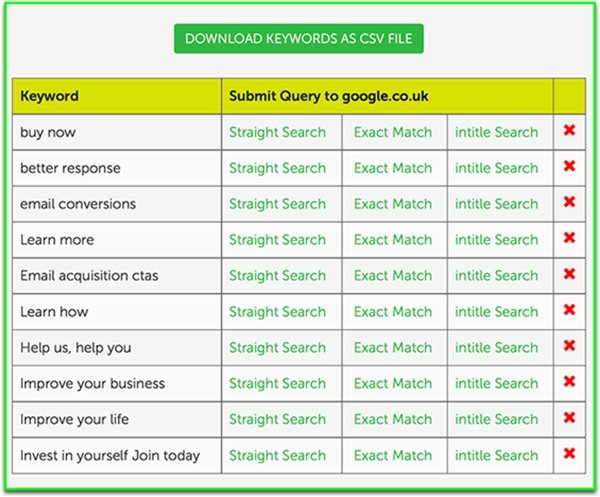
The only drawback of the tool is that there's no option to pay for additional submissions (so you don't have to share the link but instead have those keywords coming from a pool of users).
Alternative/Additional Tool
You can use MyBlogU in the same way, by copy-pasting your scenario into a new Brainstorm project field. It's a free tool, so you have nothing to lose.
With MyBlogU, you can use the pool of existing members instead of or in addition to your own contacts and followers:
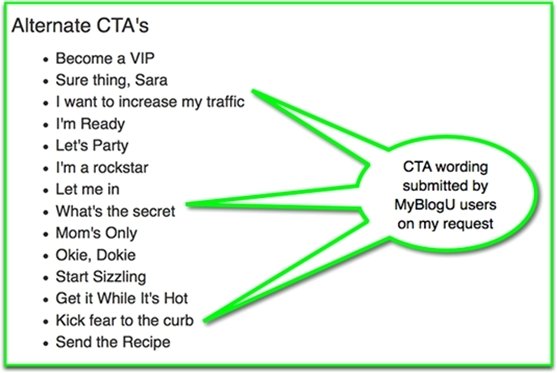
What to Do With These Keywords
These sets of keywords are not based on Google users' behavior: They are brainstormed by people and there's no stats behind them. So the first step would be to research the competition and the search volume, filter out the most "difficult" terms (or put them away until after your site is strong enough to target those), and focus on the most relevant, reachable goals.
The next step would be to expand these core terms using keyword modifiers (there's an old but still valid article on how I do it using Excel) and include those long-tail phrases into your content editorial or website infrastructure (e.g., product or category names).
2. Local Keywords: SERPstat
More often than not, local keywords are easiest to rank high for, and they mostly convert very well.
I don't know any other tool that would make filtering for location-based keywords so easy: SERPstat lets you set the filter called "Only keywords with toponyms," which allows you to see most popular locations associated with your core keyword (if you sort results by search volume).
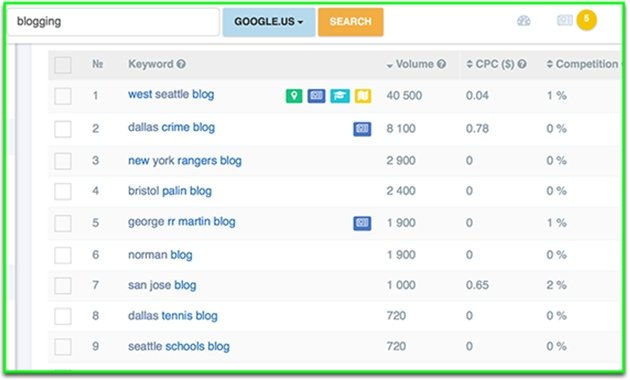
What's more, the tool allows you to filter keywords by presence of blended search results (News, Images, Maps, Videos, Shopping, etc.) and special search features (more on those here).
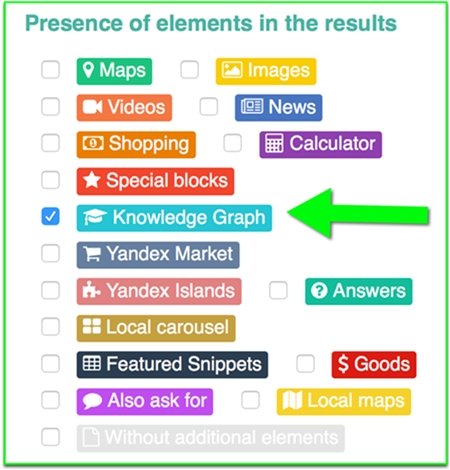
For example, you can see your location-based keywords only when they trigger the knowledge graph to quickly see "navigational" search queries (i.e., when users' intent seems to be to navigate to a particular website/brand):
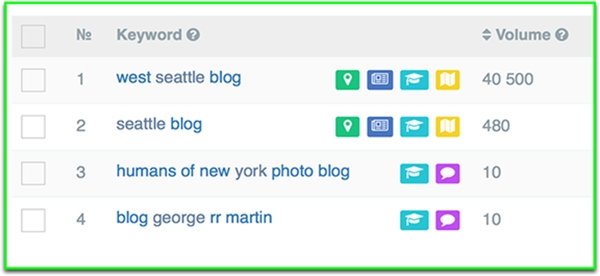
(You can read more about this feature here.)
What to Do With These Keywords
I am not talking about local businesses here: If you are a local business, chances are you are already well aware of the locations you are targeting ad you don't need additional locations. (The only exception would be if you are looking to expand to more locations; this research would then give you some data to think over.)
If you are into e-commerce or global business, or a content-based (affiliate) business, this research would give you lots of content inspiration, possibly even a series of articles talking about most popular locations in your industry.
And, surely, those location-based phrases can also be expanded further for those long-tail keywords to become subheadings for your articles. Lots of opportunity to play with and rank for there!
3. Related Terms: DeeperCloud
Whenever I need to do keyword research from scratch, I'll search for the core term and then extract words and phrases that tend to occur in the search titles and snippets next to my keyword. That approach is nothing new, but it's still underutilized.
DeeperCloud is the fastest way to do that research (it uses custom Google search). You have an option to see words or phrases neighboring your search term in Google results:
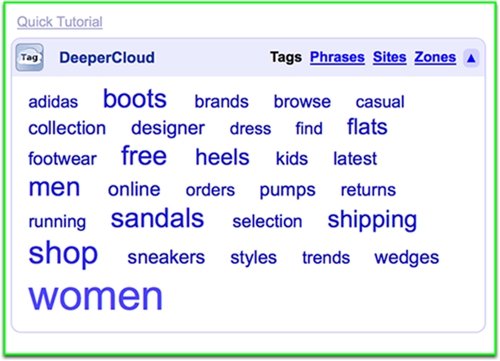
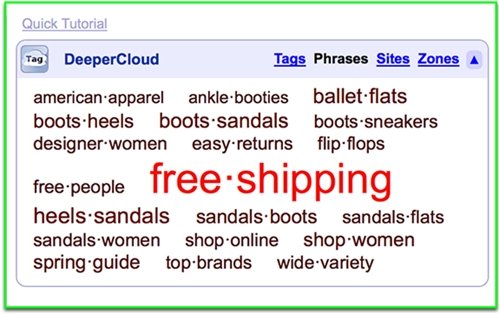
Alternative/Additional Tools
There are more ways to come up with related terms. SenseBot.net is one of the older ones. It will analyze search results and return the list of most popular terms:

You can also use this keyword density tool: Just run Google Search results URL through the tool (remove the "s" from "https" to make it work):
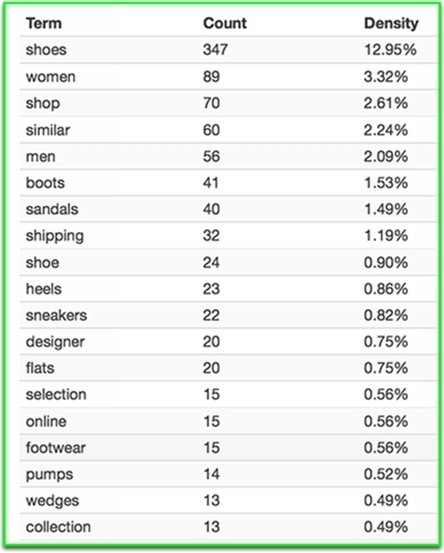
What to Do With These Keywords
These words and phrases can be worked into your search engine optimization plan in three ways:
- Some of them (those that satisfy a particular need; for example, from the screenshot above, that would be "sandals," "flats," etc.) need to be expanded using keyword modifiers.
- Some of them need to be implemented into the site architecture (again, from the research above, that would be "women," "brands," "collection," "heels," etc.)
- Some of them should be handed over to the content team with the instruction to incorporate them into the articles to make them more in depth (e.g., "online," "shipping," "gift cards")
4. Entities: AlchemyAPI
If you have trouble understanding what entities are and how they relate to search engine optimization, read this article by Bill Slawski. Bill talks about the story of one article that was once "optimized" in the "traditional" way using keywords, keyword proximity, keyword density, minimum word count, etc. That article was struggling both in rankings and engagement.
Then the article was tweaked, making it an in-depth article covering notable people and events and using high-quality citations. At 3,300 words, it was one of the longer articles on the site. The article then started moving up in rankings and attracting qualified leads naturally; they would engage with the content and then move to the other sections of the site.
Telling people about Frederick Douglas, James Hubert ("Eubie") Blake, Fanny Coppin, Billie Holiday, and Oprah Winfrey and their ties to Baltimore were the kinds of things that people wanted to learn about.
Entities are people, places, brands, and organizations. To give you an actual example of what I am talking about, Google's Knowledge Graph is an entity graph. Search for any notable name you are aware of to see how Google structures and relates entities:

And this is how knowledge graph and entities are incorporated into search:
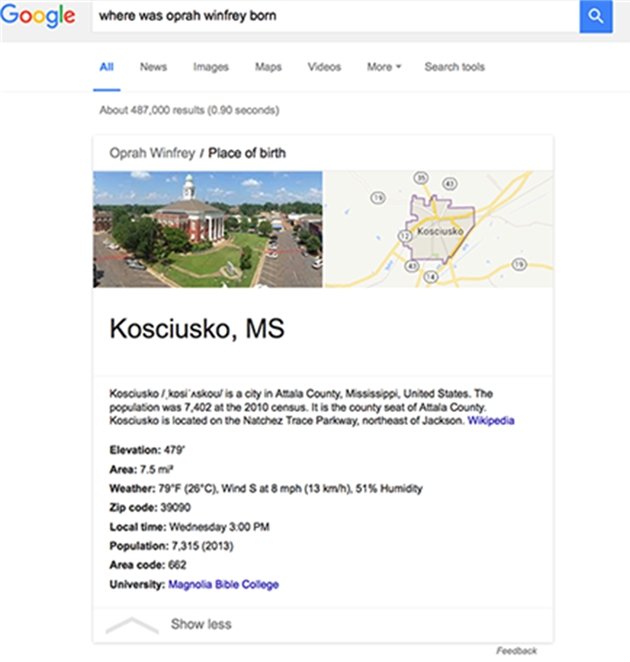
Google is looking for content that implements known entities and introduces new ones. It's building the search engine of "things instead of strings," where entities and their context play the decisive role.
These days, when the Google algorithm is learning to analyze how in-depth your article is, entity research should be part of any keyword research—and every selected entity should be researched and expanded further.
Pick a few in-depth articles on the topic you are tapping into and run them through AlchemyAPI. The tool will extract entities from the content and use color-coding to mark up sentiment.
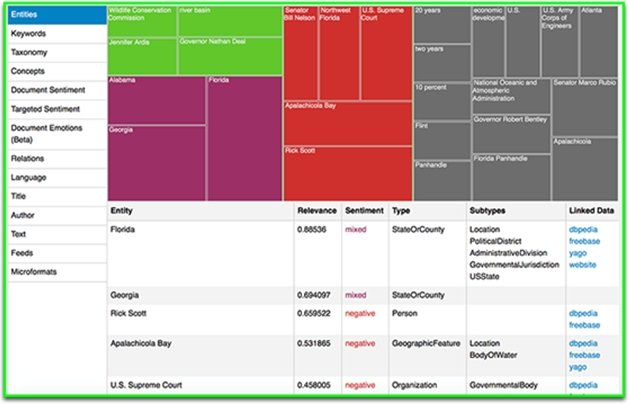
After researching a few articles, you'll have a strong list of niche-related entities that should be covered on your site.
Alternative/Additional Tools
- Text Razor
- Opencalais
- Here are also a few ways to explore related entities using Google Suggest
What to Do With These Keywords
From what you saw from the example in the beginning of this section, entities should become a solid part of your content marketing strategy. They expand your content, making it more in-depth.
Using entity research, you could create a solid "Resources" page that could attract links and authority to your site.
* * *
Has your keyword changed over the years? Which new tactics and ideas have you brought on board and what was the effect?
Are there any nonconventional or new keyword research tools you have discovered recently? Please share in the comments!




